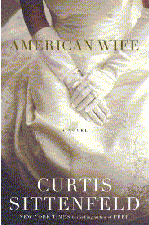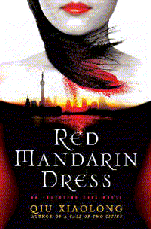 “You don’t get any fingerprints from Laura Bush.” It’s hard to know how to talk about writers when you know them. A new novel, American Wife, which may or may not evoke Laura Bush, has made Curtis Sittenfeld the subject of a column by Maureen Dowd. Good, Right? It has also caused Curtis to be held up to hysterical ridicule on a right wing blog. Not so good. The Blog is called euphemistically, Town Hall, but it’s a long way from any kind of civil discourse. One commentator alleges that all us democrats “really like trash.” Another hopes for divine vengeance on “people like . . . this loser.” Still another expresses embarrassment at being a “married relative.”
“You don’t get any fingerprints from Laura Bush.” It’s hard to know how to talk about writers when you know them. A new novel, American Wife, which may or may not evoke Laura Bush, has made Curtis Sittenfeld the subject of a column by Maureen Dowd. Good, Right? It has also caused Curtis to be held up to hysterical ridicule on a right wing blog. Not so good. The Blog is called euphemistically, Town Hall, but it’s a long way from any kind of civil discourse. One commentator alleges that all us democrats “really like trash.” Another hopes for divine vengeance on “people like . . . this loser.” Still another expresses embarrassment at being a “married relative.”
I’ve not read American Wife. It won’t be out until September. Maybe I can get a review copy. But whatever may eventuate about that, I’d like to report that Curtis is a fine writer, who deserves to be read by people who aren’t idiots. Dowd seems seems to be more fortunate than I and actually to have read the book. She writes sensitively and sympathetically of it without giving much away, like the Laura Bush she describes as guarded in interviews. “[T]he main vibe she gives off is an emphatic: ‘I am not going to show you anything.'” Dowd also suggests that “there is the air of a ‘Primary Colors’ stunt about this political roman à clef, which is timed to come out during the Republican convention.” I certainly hope so, for a host of reasons, and I hope it sells a billion copies. I’ve already ordered mine from Amazon.
 Inspector Chen. Here’s more from the groupie department. Last Christmas I learned about the novels of Qiu Xiaolong, a Chinese expatriate writer who lives in St. Louis, has translated T. S. Eliot’s poetry into Chinese, has published a book of his own English poems as well as a dual language anthology of classical Chinese poetry, and writes elegant and complex mystery novels that feature a poet/detective. I read the five Inspector Chen novels currently out in English–a sixth novel is already out in French, or will be soon–and convinced the members of a book club, to which my beloved and I belong, to read the first of them for our June meeting. A member of our group who knew how to contact Dr. Qiu invited him and his wife, Lily, to our book club meeting. And they came.
Inspector Chen. Here’s more from the groupie department. Last Christmas I learned about the novels of Qiu Xiaolong, a Chinese expatriate writer who lives in St. Louis, has translated T. S. Eliot’s poetry into Chinese, has published a book of his own English poems as well as a dual language anthology of classical Chinese poetry, and writes elegant and complex mystery novels that feature a poet/detective. I read the five Inspector Chen novels currently out in English–a sixth novel is already out in French, or will be soon–and convinced the members of a book club, to which my beloved and I belong, to read the first of them for our June meeting. A member of our group who knew how to contact Dr. Qiu invited him and his wife, Lily, to our book club meeting. And they came.
Our meeting with Xiaolong and Lily was an absolute delight. Among the many things we learned is that there is now a tour of Inspector Chen’s Shanghai, conducted by a German travel agency. After our meeting we all had dinner together at a good Chinese Restaurant in University City. It was a fine time. I teased Xiaolong about having become an overseas Chinese, a category of human almost as complex as whatever category Inspector Chen belongs to. He laughed kindly, which led me to believe that I hadn’t committed a terrible faux pas. It was a wonderful afternoon. The books are wonderful books. Read them all.
Our book club is devoted mostly to political books, many of which have been novels but not all. Our next selection is “Wilentz’s” The Age of Reagan. It’s not unreasonable to speak of Qiu’s novels as political. Melanie Kilpatrick, writing in The Wall Street Journal in 2006, listed Death of a Red Heroine as one of five best political novels of all time in a list that includes Darkness at Noon and All the King’s Men.
I’m thinking of doing some reviewing here, maybe of dredging up some old reviews as well. Perhaps because of that I’m reminded of a piece by Harold Jaffe I read not long ago in Armageddon Buffet. It’s called “The Writer in Wartime,” and it raises the question whether writers who seek aesthetic autonomy, usually understood as an a-political character, engage in what Hannah Arendt termed inner emigration or escape from responsible citizenship into fantasy or art or thought. My beloved has written a book about James Farrell’s desire to separate his literary work from his political work. For Farrell, ideology was the enemy of artistic integrity, of truth telling. But Farrell’s novels are political in the same deep way that the novels on Kilpatrick’s list are political, in the way that War and Peace and the Fixer and Reading Lolita in Tehran are political.
Qiu Xiaolong’s novels are as much about the political life of contemporary China as they are about food, psychology, family, crime and punishment, or any of the other themes that inhabit Inspector Chen’s universe. I’m looking forward to thinking about “what lies behind that placid facade of the first lady” as I read Curtis Sittenfeld’s American Wife, which I expect to be a good deal more of a read than the “women’s book-club novel” Maureen Dowd describes. As Curtis wrote in a Salon piece in 2004, “I believe that George Bush’s policies are at best misguided and at worst evil. And yet I love Laura Bush. In fact, there is no public figure I admire more.” That’s got to be a pretty complicated character to put on. And the fact that American Wife and Death of a Red Heroine have been, or seek to be, popular successes, makes them no different from the plays of Shakespeare. It’s a curious modernist elitism that ascribes excellence to books with few readers.

This is a wonderful blog, Julian. I, too, view the Chinese mysteries as highly political. I have the latest Lisa See, Dragon Bones, to pass along to you at the Hannibal drop-off in exactly 12 days (and 3 hours). It’s her best because she does such a fine job of weaving the political with the scholarly and the cultural.
Thanks, Leslie. I look forward to it.
What’s the name of the Ferrell book? I have not read any of the books you mention but will get the Sittenfeld if for no other reason than to return to the offending blog and excoriate them for offending rib eaters.
Glad you are heading into reviews. And I await some film reviews as well. Heading to Amazon as I leave here.
It’s called Literary Integrity And Political Action: The Public Argument Of James T. Farrell
http://www.amazon.com/Literary-Integrity-Political-Action-Argument/dp/0813390710/ref=sr_1_2?ie=UTF8&s=books&qid=1215834588&sr=1-2
It is on its way to me. Yeay. Thanks.
You’re welcome.